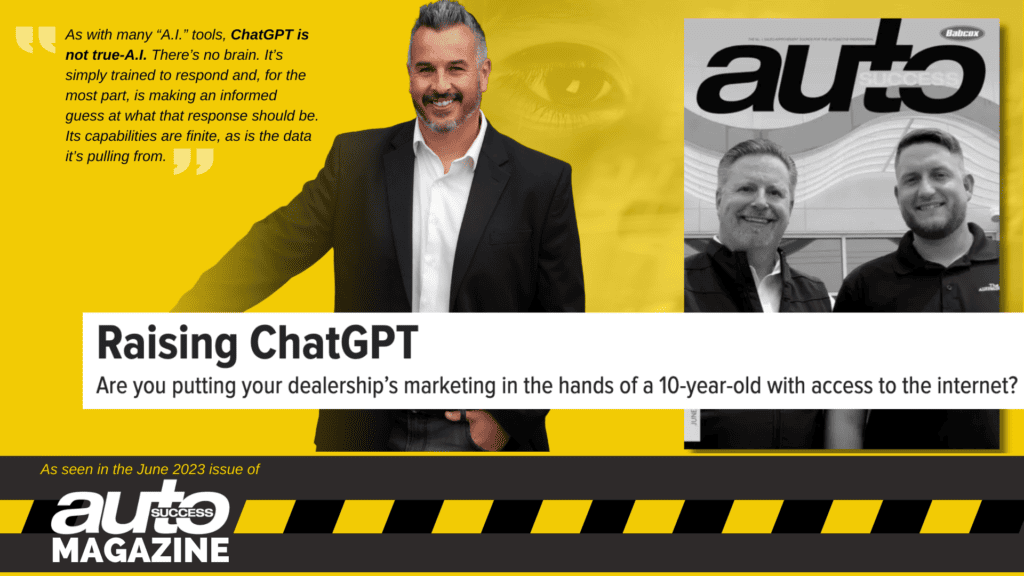
“So, basically…ChatGPT is the equivalent of a 10-year-old with access to the internet.”
The summation was a simple one, made during a workshop focused on the promise, prompts, and perils of the AI platform as it relates to automotive marketing. But once uttered, the silently-attentive room of dealer marketers, sales managers, GMs, and dealer principles stirred in unison, sharing in a mutual chuckle, validating the relatability of the sentiment.
“Resonance,” I thought, looking on as my two colleagues pivoted to the next slide in their ‘standing room only’ workshop.
In any other instance, at any other time, the statement (delivered with almost-comedic levity) might have been regarded as a throwaway joke. But in late-May 2023, with society struggling against the current of ‘all things ChatGPT,’ the effort put into demystifying the platform felt punctuated by that summation. In fact, the likening of ChatGPT to a “10-year-old with access to the internet” became one of the most repeated takeaways from attendees of the Digital Marketing Strategies Conference in Austin, TX.
A Snapshot: ChatGPT in May 2023
Dealers who arrived at the conference placing blind trust in the tool as a means of automating content generation or believing that it could somehow replace their marketing would leave with a clearer understanding of why that simply wasn’t the case. In fact, depending on how much they were intending to use ChatGPT, they might have to start thinking about claiming the AI tool as a dependent. Why? Because using ChatGPT effectively means a willingness to “parent” ChatGPT, both relentlessly and unapologetically.
- ChatGPT stands for ‘Chat Generative Pre-Trained Transformer.’ Through a chat interface, it’s designed to respond to a user prompt by sourcing information from public and private data sets that it had been trained on as of mid-2021 and transforming the response into the format requested by the user.
- ChatGPT’s limitations are clearly communicated on its homepage:
- May occasionally generate incorrect information.
- May occasionally produce harmful instructions or biased content.
- Limited knowledge of world and events after 2021.
- According to studies, ChatGPT is “only mostly correct,” proving accurate about 80% of the time. Inaccuracies can be attributed to the shortcomings listed above, combined with ChatGPT’s tendency to “hallucinate” (making things up and presenting them as facts in an attempt to formulate its response).
- ChatGPT forms its answer based on calculating the mathematical probability of a word showing up, similar to the predictive text feature on your phone. In other words, it’s basically a “really fancy word predictor.”
- ChatGPT is good at mundane tasks, ones that don’t require a high degree of accuracy, and at providing summaries.
These are important distinctions because they dispel a number of myths. As with many “A.I.” tools, ChatGPT is not true-A.I. There’s no brain. It’s simply trained to respond and, for the most part, is making an informed guess at what that response should be. Its capabilities are finite, as is the data it’s pulling from. It’s fallible, subject to inaccuracies, and designed to be guided (on both ends of its process) by a human user. In other words, it needs you to parent it…just like a 10-year-old with access to the internet.
The Takeaway is Clear
Under no circumstances would you risk the success (or even the survival) of your dealership by placing your marketing in the hands of an unsupervised 10-year-old.
Now…apply the same mindset to ChatGPT (or any AI tool that’s being served up to you as the next shiny thing that’s “sure to be a game changer”), and you’ve taken the first step in your journey of AI-parenting. You’re accepting that you play a key role in every outcome. You’re setting reasonable expectations and defining boundaries. You’re recognizing what the tool is good at, where it falls short, and the importance of supervision and guidance. And yes…by taking the time to understand that dynamic now, you’ll have a better understanding of how ChatGPT (and your relationship with it) will evolve from this point on.
That said, sorry…you can’t actually claim ChatGPT as a dependent.